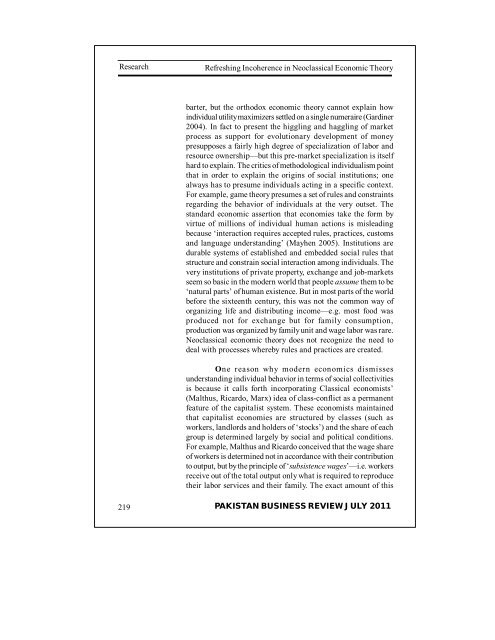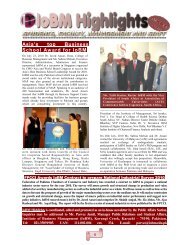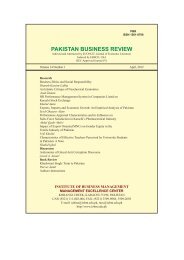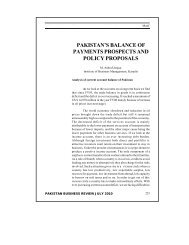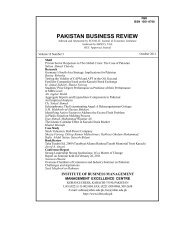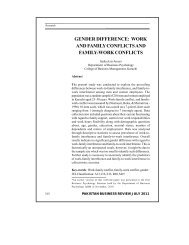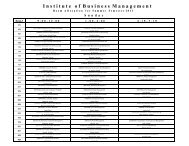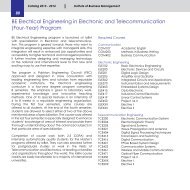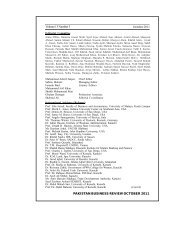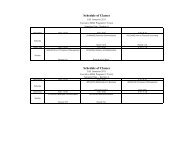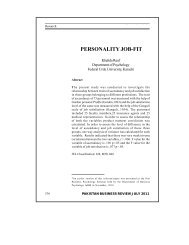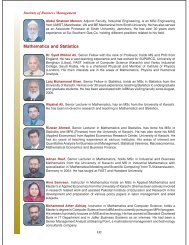PAKISTAN BUSINESS REVIEW - Institute of Business Management
PAKISTAN BUSINESS REVIEW - Institute of Business Management
PAKISTAN BUSINESS REVIEW - Institute of Business Management
Create successful ePaper yourself
Turn your PDF publications into a flip-book with our unique Google optimized e-Paper software.
Research<br />
Refreshing Incoherence in Neoclassical Economic Theory<br />
barter, but the orthodox economic theory cannot explain how<br />
individual utility maximizers settled on a single numeraire (Gardiner<br />
2004). In fact to present the higgling and haggling <strong>of</strong> market<br />
process as support for evolutionary development <strong>of</strong> money<br />
presupposes a fairly high degree <strong>of</strong> specialization <strong>of</strong> labor and<br />
resource ownership—but this pre-market specialization is itself<br />
hard to explain. The critics <strong>of</strong> methodological individualism point<br />
that in order to explain the origins <strong>of</strong> social institutions; one<br />
always has to presume individuals acting in a specific context.<br />
For example, game theory presumes a set <strong>of</strong> rules and constraints<br />
regarding the behavior <strong>of</strong> individuals at the very outset. The<br />
standard economic assertion that economies take the form by<br />
virtue <strong>of</strong> millions <strong>of</strong> individual human actions is misleading<br />
because ‘interaction requires accepted rules, practices, customs<br />
and language understanding’ (Mayhen 2005). Institutions are<br />
durable systems <strong>of</strong> established and embedded social rules that<br />
structure and constrain social interaction among individuals. The<br />
very institutions <strong>of</strong> private property, exchange and job-markets<br />
seem so basic in the modern world that people assume them to be<br />
‘natural parts’ <strong>of</strong> human existence. But in most parts <strong>of</strong> the world<br />
before the sixteenth century, this was not the common way <strong>of</strong><br />
organizing life and distributing income—e.g. most food was<br />
produced not for exchange but for family consumption,<br />
production was organized by family unit and wage labor was rare.<br />
Neoclassical economic theory does not recognize the need to<br />
deal with processes whereby rules and practices are created.<br />
One reason why modern economics dismisses<br />
understanding individual behavior in terms <strong>of</strong> social collectivities<br />
is because it calls forth incorporating Classical economists’<br />
(Malthus, Ricardo, Marx) idea <strong>of</strong> class-conflict as a permanent<br />
feature <strong>of</strong> the capitalist system. These economists maintained<br />
that capitalist economies are structured by classes (such as<br />
workers, landlords and holders <strong>of</strong> ‘stocks’) and the share <strong>of</strong> each<br />
group is determined largely by social and political conditions.<br />
For example, Malthus and Ricardo conceived that the wage share<br />
<strong>of</strong> workers is determined not in accordance with their contribution<br />
to output, but by the principle <strong>of</strong> ‘subsistence wages’—i.e. workers<br />
receive out <strong>of</strong> the total output only what is required to reproduce<br />
their labor services and their family. The exact amount <strong>of</strong> this<br />
219<br />
<strong>PAKISTAN</strong> <strong>BUSINESS</strong> <strong>REVIEW</strong> JULY 2011


